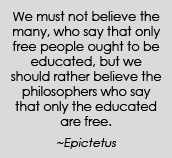ANNUAL CONFERENCE
 |
The nationwide Process Education community
will come together for our annual conference from June 27 to
June 29, 2010, at St. Louis College of Pharmacy. Have you
registered?
Please consider sharing a personal best
practice in a workshop, paper, or Hall of Innovation poster.
Submit a proposal via the
conference website.
On the website, you can learn more about the program and special
events, register, and make plans for lodging. The $300
registration fee can be paid by check or online by credit card.
|
|
The registration fee includes: program
booklet, appetizers Sunday evening (June 27), lunches (June 28
and 29), a dinner cruise on the
Mississippi
(June
28), as well as the annual Academy membership fee. Conference
hotel: The Parkway Hotel is located one block from the building
housing the conference sessions. Secure the special lodging rate
using the instructions on the conference website.
|
Highlights:
PLENARY
Larry Michaelsen, University of
Central Missouri
A renowned author and professor of
management, Larry Michaelsen pioneered the development of Team-Based
Learning with a focus upon the key characteristics of effective team
assignments. In the plenary session, as well as the breakout sessions
which he will lead, you will be engaged in a series of activities that
demonstrate why most problems with learning groups are caused by poorly
designed assignments. In addition, four key factors will enable you to
design group assignments that:
1) are effective for developing students’ application
of critical-thinking skills,
2) promote positive student attitudes about group
work,
3) can be graded easily and fairly and,
4) can be used with any level of students and in
classes of several hundred students.
Highlights:
PLENARY
Don Saari, University of California, Irvine
A
distinguished professor of mathematics and economics, Don Saari will
offer a plenary and breakout sessions, which will engage the audience in
the application of mathematics in solving serious and complex problems
we currently face. Furthermore, he will emphasize techniques for
equipping and empowering students to solve problems that we can barely
imagine today. In What the Best College Teachers Do, Ken Bain
paints a picture of Don Saari’s teaching on the first page of his book.
He writes that Saari uses a mixture of humor, storytelling, and
questioning so that his calculus students think they invented
calculus. As a researcher, Saari combines his two disciplines
(mathematics and economics) in a fascinating analysis of real-world
problems, ranging from elections and the mysteries of voting to more
esoteric problems, such as Newton's N-body problem and the evolution of
the universe.
Highlights:
PLENARY
Dan Apple, Pacific Crest
How can problems be solved in real time? During this plenary Dr. Apple
will work with a panel of experts to address an issue facing higher
education today. The goal will be to make meaningful progress on a
solution as the audience observes how a problem solving methodology (Faculty
Guidebook 2.2.6: Overview of Problem Solving) is utilized in real
time. The session will conclude with assessment reports by the audience,
the experts, and facilitator. Attention will be given to the quality of
the solution developed as well as the solution process itself.
ACADEMY MEETING MINUTES
Academy members can use the Members page of our
website (www.processeducation.org)
to review notes from Academy functions throughout the year. There you
will find, for example, the recent minutes from an ad hoc get together
January 10-11, 2010 in St. Louis.
Nine
of us reviewed the attractive venue for the summer conference,
collaborated on Academy research projects, brainstormed ideas for member
communication and outreach, learned about the new I-STAR Foundation, and
suggested updates to the Academy's strategic plan. While the minutes
aren't a perfect substitute for actually being there, they are the next
best thing. The archive also includes monthly board meetings and extends
back to the Academy meeting immediately following the 2009 conference.
FRESHMAN TEXTBOOK FOR
ENGINEERING AND TECHNOLOGY
Process Educators Jim Morgan (Texas A&M), Greg
Neff (Purdue
University),
Barbara Williams, Steve Beyerlein, and Dan Cordon (University
of
Idaho)
are developing a new freshman textbook, building on Foundations of
Learning. The original text provides guided inquiry and activities
for incoming college students to build transferable learner skills
including: problem solving, communication, teamwork, and self-identity.
Ultimately, the original text will be augmented in the areas of problem
solving, design, and mathematical modeling so that it is better suited
for freshman entering Engineering and Engineering Technology fields. To
date, particular emphasis has been given to analytical problems
(homework style, single answer, number-crunching) as well as open-ended
problems (real-world, mixed qualitative/quantitative, multiple answer).
A generalized rubric for analytical problem solving has been tested and
refined using examples of student work from multiple STEM disciplines.
This will be the subject of a hands-on workshop at the 2010 Process
Education Conference.
WRITING RUBRIC PROJECT
Research collaborators on the
reliability study of the Writing Rubric (published in the Faculty
Guidebook) conducted a rating exercise at the winter meeting in St.
Louis. The results indicated that some of the criteria, as well as other
elements of the rubric need additional editing to increase common
understanding of the terms and their use by raters. Cy Leise, Tris
Utschig, Kathy Burke, and Steve Beyerlein will decide on these changes
and then proceed to further piloting before planning a proposal for
review by the IRB at the Georgia Institute of Technology. The proposal
will involve rating three type of papers by three raters. Approximately
50 papers of each type will be rated in order to have statistically
representative samples. We will explore the level of consistency between
raters for both specific criteria within the rubric and total scores. By
establishing the reliability of this important process education
assessment and evaluation tool, it will become possible to use it with
confidence for many writing products and contexts.
FACULTY GUIDEBOOK LEARNING
OBJECT
Karen Anderson and Steve
Beyerlein facilitated three hands-on, 75-minute workshops focused on the
Faculty Guidebook for more than 80 MATC (Madison Area Technical
College) faculty at the Winter 2010 Convocation. The workshops included
the use of a revised learning object entitled 'The Faculty Guidebook: A
Tool for Continuous Improvement in Teaching and Learning.' Learning
outcomes for the MATC workshop are widely applicable to other
faculty/staff orientation sessions and include the following:
-
Understand the organization
of the
Faculty Guidebook
and be able to link each
section with at least two topics of personal interest to you as an
educator.
-
Appreciate the rationale
behind
Faculty Guidebook
module design as well as know how the use of
these modules can help you meet your personal professional
development needs.
-
Know how to use the on-line search features of
the e-Faculty Guidebook to identify 3-6 resources related to an area
in which you would like to improve your professional performance.
I-STAR
FOUNDATION
 Over
the last three months Joann Horton has worked hard to establish the
Institute for Student Transformation and Academic Readiness (I-STAR).
This is a non-profit organization, which provides leadership in
designing learning environments designed to generate enhanced learning
and success for students who are at-risk of not transitioning
successfully from high school to college. I-STAR is dedicated to
facilitating both the learning and growth of students so that they
become self- reliant and confident individuals, thereby improving the
quality of their lives. A special focus of
I-STAR is the preparation and delivery of Learning to Learn
Camps along with associated faculty/staff development. Joann, along with
colleagues at Grand Valley State University, Lamar University, North
Carolina Central University, Gaston College and the University of Idaho
are actively pursuing grant opportunities to study the impact of
Learning to Learn Camps. You can learn more about the I-STAR Foundation
at:
www.i-starfoundation.org.
Over
the last three months Joann Horton has worked hard to establish the
Institute for Student Transformation and Academic Readiness (I-STAR).
This is a non-profit organization, which provides leadership in
designing learning environments designed to generate enhanced learning
and success for students who are at-risk of not transitioning
successfully from high school to college. I-STAR is dedicated to
facilitating both the learning and growth of students so that they
become self- reliant and confident individuals, thereby improving the
quality of their lives. A special focus of
I-STAR is the preparation and delivery of Learning to Learn
Camps along with associated faculty/staff development. Joann, along with
colleagues at Grand Valley State University, Lamar University, North
Carolina Central University, Gaston College and the University of Idaho
are actively pursuing grant opportunities to study the impact of
Learning to Learn Camps. You can learn more about the I-STAR Foundation
at:
www.i-starfoundation.org.
Opening
up the Dialogue
Did you know that members of the Academy of
Process Educators, receive FREE access to
Dialogues in Process Education?
Dialogues (from
Pacific Crest) has received a real facelift and is now easier to use,
packed with exciting features. It is still your best bet for engaging in
ongoing scholarship in Process Education. The easiest way for Academy
members to visit Dialogues
is to select it from the Members page on the Academy website. If you're
an Academy member, why
not take advantage of this wonderful membership benefit today? (And if
you're not yet a member, why not join?)
![]()


